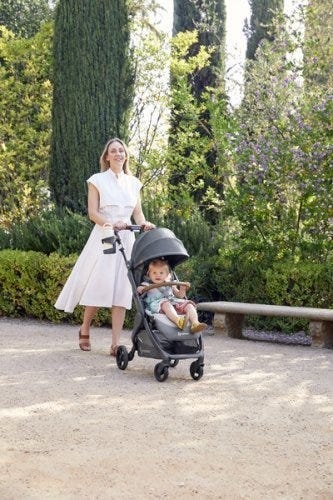A 3-month-old baby conducting her mother's singing of a lullaby. A vast study demonstrating the links between childhood experiences and health in adulthood. Monkeys with bad genes that turn out fine when receiving good mothering.Attending this symposium awoke feelings of both deep concerns about how many parents in the so-called developed countries, including the United States, give birth and care for their babies. It also inspired me and strengthened my dedication to the work we are doing at ERGObaby and also the work that we share in common with the Attachment Parenting International Organization. The symposium brought a difficult message to the forefront. First the concern part, and please brace yourselves for some disturbing reading I am quoting the organizers' background information from the conference: "It is becoming increasingly clear that the ways we are rearing our children today are not the ways humans are designed to thrive. The ill effects of these missing ancestral practices are becoming evident as children's well being in the USA is worse than 50 years ago and is among the worst in the industrialized world (20th in family and peer relationships and 21st in health and safety, according to United Nations Children's Fund (UNICEF). We have epidemics of ADHD, anxiety and depression among the young, indeed all age groups, according to United States Department of Health and Human Services. Too many children are arriving at school with poor social skills, poor emotion regulation, and habits that do not promote pro-social behaviors. Rates of young children whose behavior displays aggression, delinquency, or hyperactivity are estimated to be as high as 25%. The expulsion rate of prekindergarten children and the number of children under age 5 with psychosocial problems or on psychotropic medications have increased dramatically. The organizers continued by describing some of the ills also besetting adults: Second, "in recent years a host of public, personal and social health problems have been skyrocketing in the USA, and increasingly around the world, for which science does not have consistent or reliable answers (e.g., psychological problems such as ADHD, autism, anxiety and depression; not to mention psychosomatic conditions such as diabetes, hypertension, and a variety of autoimmune disorders. Now what might this whole catalogue of human misery have to do with attachment parenting and the ways we choose to give birth and care for our babies? Over the last 10-15 years, researchers working in such diverse fields as animal studies, human psychology, neurobiology and anthropology have proven in a great variety of studies how important the early life conditions are for optimal brain and body system development. And what is more, even the genetic heritage the genes - can be influenced substantially by the caregiving one receives. As an example, animals with a gene that would normally predispose them to e.g. depression can turn out completely normal, if they receive a sufficiently caring upbringing. Given that there are and have been so many views over the years historically and originating from authoritative psychologists and prominent pediatricians on what the most optimum early life conditions are for a human baby, the organizers chose as their point of departure and basic frame of understanding the term "Environment of Early Adaptedness . What do the organizers mean with by "Environment of Early Adaptedness ? It refers to the presumptive conditions under which our brains and body systems are likely to have evolved during the Pleistocene period (1.800.000-10.000 years B.C.), conditions which, albeit theoretically inferred, characterize over 99% of human existence in small bands of hunter-gatherers. Substantive evidence of this type of environment and style of caring for children comes from studies of foraging communities around the world. As anthropologists summarize "Environment of Early Adaptedness characteristics for infants and young children, we can be confident that young children in foraging cultures:
- go through natural births (there is no alternative)
- are nursed frequently
- are held, touched, or kept near others almost constantly
- are frequently cared for by individuals other than their mothers (fathers and grandmothers, in particular) and sometimes by older siblings
- experience prompt responses to their fusses and cries
- normally continue breastfeeding up to 2-5 years
- enjoy multiage play groups in early childhood
Further resources:
- The symposium has a website where speaker biographies and the individual presentations can be viewed: http://ccf.nd.edu/symposium/
- The Attachment Parenting International Organization:http://www.attachmentparenting.org/
Emotional Benefits of Getting Outside
Spending time in nature with your baby can strengthen the bond between you. The simple act of holding your baby close, feeling their warmth, and sharing new experiences together can create strong emotional connections. It’s also a wonderful way to reduce stress and improve your mood. When my littles were extra fussy, I’d take a walk around the neighborhood. Even though I don't live in an area with trails and surrounded by nature, simply behind outside changed everything. A little vitamin D does wonders!
Cognitive Development
Nature is a sensory wonderland for babies. The different sights, sounds, and smells can stimulate your baby’s senses and promote cognitive development. Watching leaves rustle, hearing birds chirp, and feeling the texture of a tree bark can all contribute to their learning and development.
All About Baby Carriers for Nature Adventures
Choosing the Right Baby Carrier
When it comes to selecting the best baby carrier for summer adventures, there are several options to consider.
Types of Baby Carriers:
- Wraps: Perfect for newborns, providing a snug and secure fit.
- Slings: Ideal for quick and easy use, offering good ventilation.
- Soft Structured Carriers: Versatile and comfortable for both parent and baby, suitable for longer trips.
Factors to Consider:
- Baby’s Age and Weight: Ensure the carrier is appropriate for your baby’s size and weight. For example, Ergobaby’s Embrace Newborn Carrier is perfect for the fourth trimester where baby is small and you’re looking for an easy way to stay close. As they grow, you’ll want to upgrade to an all-position carrier that’s meant for growing babies.
- Parent’s Comfort and Ergonomics: Look for carriers with padded shoulder straps and lumbar support if you’re planning on longer outings.
- Ease of Use: Choose a carrier that is easy to put on and take off.
- Climate and Breathability: Opt for carriers made of breathable fabrics to keep you and your baby cool in hot weather.
Safety Tips:
- Proper Positioning: Ensure your baby is seated correctly, with their legs in an "M" position and their head should be close enough to kiss.
- Checking for Wear and Tear: Regularly inspect your carrier for any signs of damage.
- Ensuring Adequate Support: Make sure the carrier provides proper support for your baby’s head and neck.
Exploring Nature with a Baby Carrier
Ideal Spots for a Nature Walk with Baby
- Parks and Gardens: Great for leisurely walks and picnics.
- Nature Trails and Forests: Perfect for more adventurous outings.
- Beaches and Lakesides: Wonderful for enjoying the water and sand, with the right carrier.
Activity Ideas
- Hiking: Enjoy a scenic hike with a hiking baby carrier that offers support and storage.
- Bird Watching: Use your carrier to keep your baby close while you explore and observe wildlife.
- Picnics: A carrier can free up your hands, making it easier to carry picnic supplies.


Advantages of Using Strollers for Nature Adventures


While baby carriers are fantastic for mobility and closeness, depending on the adventure of choice you might want to be a stroller along too.
There are a LOT of baby stroller options on the market. So we understand how confusing it can be to choose the one that’s right for your family. Not only are there a variety of brands, but a variety of strollers that serve different purposes.
There are a few types of strollers on the market:
- Full-sized stroller: This is typically the stroller parents thing of buying for all its versatility.
- Lightweight or umbrella stroller:These compact strollers are perfect for on-the-go adventures.
- Jogging stroller: Designed for parents who want to combine fitness with outdoor adventures.
- Double stroller: Designed for parents with multiple kids, especially twins.
- Car seat carrier: These strollers connect to a specific car seat. We don't typically recommend these as they can be unsafe for baby and uncomfortable for parents who are pushing.
Learn more about the types of strollers and which one would be best for you.
Benefits of Bringing a Stroller
- Storage Space for Gear: Ample room for carrying all your essentials like a diaper bag, beach toys and more.
- Shade and Weather Protection: Built-in canopies to shield your baby from the sun when they are lounging.
- Options: If you have more than one kid, you can stroll with one and carry the other. Or, if you’re getting warm or your little one is getting fussy, you can switch up their position from stroller to carrier or vice versa.
Safety Tips for Strollers
- Ensure your stroller is in good working condition. Make sure buckles are still buckling and that there are no rips or holes that could compromise your baby’s safety.
- Use sunshades or bug nets to protect your little one’s skin.
- Securing the baby properly: always buckle up your baby for safety even if you think they are old enough to go without the buckle.
Combining Baby Carriers and Strollers
For the ultimate flexibility, consider using both a baby carrier and a stroller on your outings.
Combining both options allows you to adapt to different situations. Use the carrier for more rugged trails and switch to the stroller for smoother paths or when your baby needs a nap.
Transition Tips
- Smooth Transitions: Plan stops where you can easily switch from carrier to stroller.
- Pack Light: Only bring essentials to make transitions easier.
Tips for a Successful Adventure
Planning Ahead
- Route Planning: Choose baby-friendly trails and parks. Check local mom groups or outdoor groups and get recommendations for the best outings for kids.
- Check Weather Conditions: Avoid extreme heat or unpredictable weather. Even with our most breathable carriers, when it’s hot, it’s hot. And having two bodies against each other in the heat will be naturally hot and sticky already.
- Packing Checklist: Include diapers, snacks, water, sunscreen, and a first-aid kit. These all-position carriers have storage pockets where you can fit some of the items easily!
- Stay Hydrated and Nourished: Pack healthy snacks to keep energy levels up and bring plenty of water for both you and baby.


Summer adventures with your baby are a wonderful way to create lasting memories and enjoy the beauty of nature together. From baby carriers to strollers, Ergobaby products are designed to provide comfort and ease for both you and your little one. So, gear up, get outside, and explore the world with your baby by your side.
Ready to embark on your own summer adventures? Check out Ergobaby’s range of baby carriers and strollers to find the perfect match for your family’s needs. Visit our website today and start planning your next outdoor excursion!




























